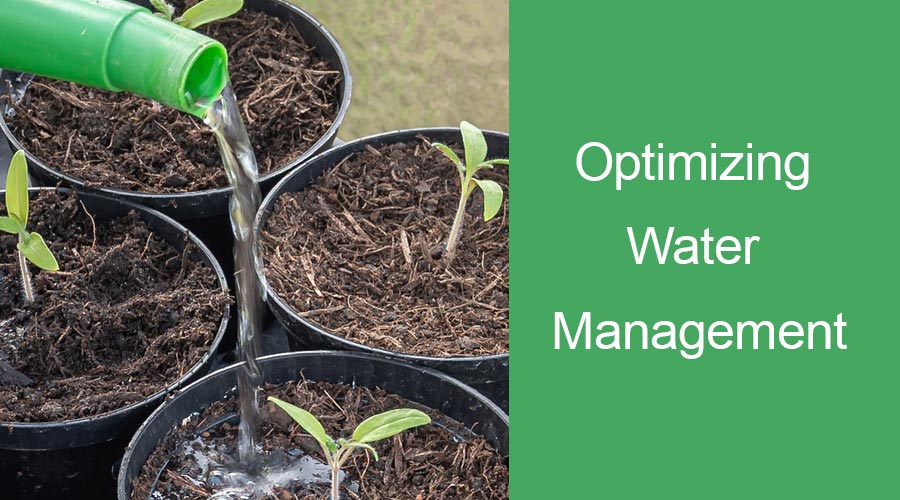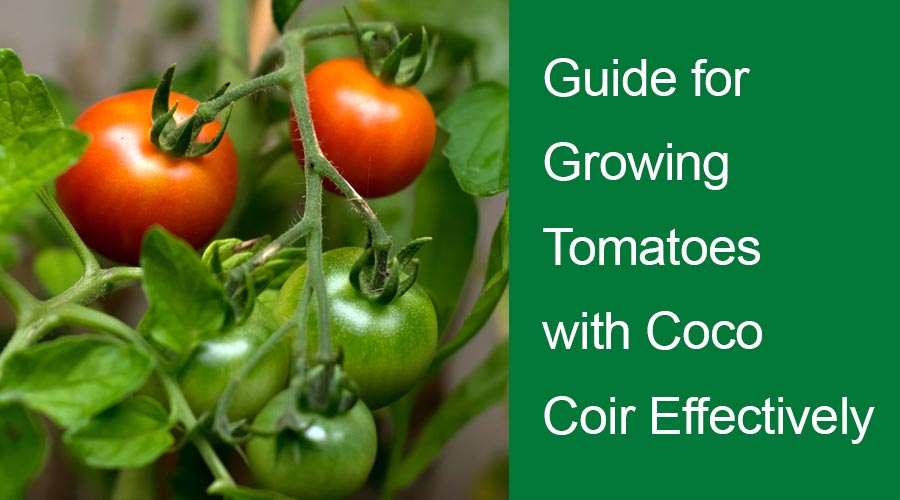Best Guide for Growing Tomatoes with Coco Coir Effectively
Tomatoes are a popular choice for home gardeners due to their versatility and delicious taste. Growing tomatoes in coco coir is a fantastic way to nurture healthy plants while also being environmentally friendly. Coco coir, derived from coconut husks, is a sustainable alternative to peat moss that provides excellent air porosity and water retention for tomato plants.
Understanding the Benefits of Using Coco Coir for Tomato Plants
Coco coir offers several advantages as a growing medium for tomatoes. It is rich in nutrients, has natural anti-fungal properties, and promotes strong root development. Additionally, coco coir is lightweight and easy to handle, making it a convenient option for gardeners. Using coco coir can also lead to healthier tomato plants with increased yields.
One of the key benefits of coco coir is its excellent water retention capabilities. This helps in maintaining the optimal moisture levels for tomato plants, ensuring they receive adequate hydration without the risk of over-watering. Coco coir also promotes good aeration, which is vital for healthy root growth and overall plant development.
Advantages of Coco Coir as a Growing Medium
Coco coir acts as a sustainable alternative to peat moss, offering excellent air porosity and water retention, promoting healthy root development and higher yields.
Coco coir enhances soil structure, retains moisture efficiently, and provides essential nutrients to support the growth of robust tomato plants.
How to Prepare Coco Coir for Tomato Planting
To prepare coco coir for planting tomatoes, first, hydrate the coco coir bricks or blocks by soaking them in water until they expand. Fluff up the coir to ensure it is light and airy before transferring it to planting containers. Mix in some perlite or compost to enhance drainage and nutrient content for optimal tomato growth.
When growing tomatoes in coco coir, ensure the substrate is well-moistened but not waterlogged to support healthy root development and prevent water-related issues. Regularly check the moisture levels in the coco coir and adjust watering frequency accordingly to maintain optimal growing conditions for your tomato plants.
Optimizing Water Management for Tomato Plants in Coco Coir
 Proper water management is crucial for the successful growth of tomato plants in coco coir. Consistent and adequate watering is essential to avoid issues such as over-watering, which can lead to root rot and other plant diseases. By understanding the water needs of tomato plants, gardeners can ensure optimal growth and productivity.
Proper water management is crucial for the successful growth of tomato plants in coco coir. Consistent and adequate watering is essential to avoid issues such as over-watering, which can lead to root rot and other plant diseases. By understanding the water needs of tomato plants, gardeners can ensure optimal growth and productivity.
To enhance water retention in coco coir, consider mixing in coconut fiber or coco peat to improve the substrate’s ability to hold moisture. This can help reduce the frequency of watering while ensuring that the tomato plants receive consistent hydration. Additionally, using larger containers for growing tomatoes allows for better water retention and root development in the coco coir medium.
Importance of Proper Watering Techniques
Proper watering techniques are essential for the health and productivity of tomato plants in coco coir. Consistent and even watering helps prevent issues like root rot and nutrient deficiencies, ensuring robust plant growth throughout the growing season.
Applying an irrigation system that delivers water effectively to the roots of tomato plants in coco coir is key to maintaining optimal moisture levels. Avoid irregular watering schedules that can stress the plants and lead to fluctuations in soil moisture levels, impacting plant growth and fruit production.
Ways to Enhance Water Retention in Coco Coir
Enhancing water retention in coco coir can be achieved by incorporating materials like coconut fiber or coco peat into the growing medium. These additions improve the substrate’s ability to hold moisture, reducing the frequency of watering needed for tomato plants.
Using larger containers when growing tomatoes in coco coir provides more space for root development and helps retain moisture for sustained plant growth. Ensure the coco coir is evenly moist, but not waterlogged, to support healthy root systems and maximize nutrient uptake for thriving tomato plants.
Addressing Issues of Over-Watering and Root Rot
To prevent over-watering and root rot in tomato plants grown in coco coir, it is essential to monitor soil moisture levels regularly. Adjust watering practices based on the plant’s needs, considering factors like temperature and humidity to maintain an optimal growing environment.
Proper drainage and aeration in the coco coir substrate are crucial for preventing waterlogged conditions that can lead to root rot. By ensuring adequate air circulation around the roots, gardeners can promote healthy root systems and overall plant vitality in their tomato garden.
Exploring Hydroponic Techniques for Growing Tomatoes with Coco Coir
Hydroponic gardening with coco coir offers a soilless growing method that provides excellent water and nutrient uptake for tomato plants. By utilizing a hydroponic system, gardeners can optimize plant growth and control nutrient delivery, resulting in healthy and productive tomato plants.
Choosing the right irrigation system is essential for hydroponic tomato plants grown in coco coir. Options like drip irrigation or ebb and flow systems can efficiently deliver water and nutrients to the root system, ensuring balanced nutrition and hydration for optimal tomato growth and fruit development.
Introduction to Hydroponic Gardening with Coco Coir
Hydroponic gardening involves growing plants in a nutrient-rich water solution without soil, making it an efficient and sustainable method for cultivating tomatoes with coco coir. This technique allows for precise control over nutrient levels and water uptake, promoting rapid growth and higher yields.
Using coco coir as a growing medium in hydroponic systems offers excellent water retention and aeration for tomato plants. The inert nature of coco coir ensures a clean and disease-free environment, ideal for promoting strong root systems and vigorous plant growth in hydroponic setups. Framers can use our grow bags, open top bags and propagation plugs for their tomato plants.
Choosing the Right Irrigation System for Hydroponic Tomato Plants
Selecting an appropriate irrigation system is crucial for hydroponic tomato plants grown in coco coir. Systems like drip irrigation or nutrient film technique (NFT) provide efficient water and nutrient delivery to the plants’ root zones, supporting healthy growth and maximum nutrient absorption.
Ensure that the hydroponic system maintains consistent moisture levels in the coco coir medium, allowing the tomato plants to access water and nutrients as needed for optimal growth. Proper irrigation management is essential for hydroponic gardening success, ensuring plants thrive in a controlled and nutrient-rich environment.

